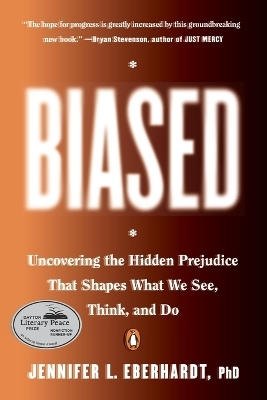
Biased
Penguin USA (Verlag)
978-0-7352-2495-7 (ISBN)
"Groundbreaking."—Bryan Stevenson, New York Times bestselling author of Just Mercy
From one of the world’s leading experts on unconscious racial bias come stories, science, and strategies to address one of the central controversies of our time
How do we talk about bias? How do we address racial disparities and inequities? What role do our institutions play in creating, maintaining, and magnifying those inequities? What role do we play? With a perspective that is at once scientific, investigative, and informed by personal experience, Dr. Jennifer Eberhardt offers us the language and courage we need to face one of the biggest and most troubling issues of our time. She exposes racial bias at all levels of society—in our neighborhoods, schools, workplaces, and criminal justice system. Yet she also offers us tools to address it. Eberhardt shows us how we can be vulnerable to bias but not doomed to live under its grip. Racial bias is a problem that we all have a role to play in solving.
Jennifer Eberhardt is a professor of psychology at Stanford and a recipient of a 2014 MacArthur "genius" grant. She has been elected to the National Academy of Sciences, the American Academy of Arts and Sciences, and was named one of Foreign Policy's 100 Leading Global Thinkers. She is co-founder and co-director of SPARQ (Social Psychological Answers to Real-World Questions), a Stanford Center that brings together researchers and practitioners to address significant social problems.
Introduction I walked in through a sea of navy-blue uniforms. The auditorium was filled to capacity, with 132 sworn members of the Oakland Police Department sitting motionless with perfect posture: erect, arms crossed. As I walked down the aisle to take the stage, I could not see their faces, but I already knew what they were thinking. The road to this particular presentation was a long one. The police force was still recovering from a major scandal that had left a legacy of distrust in the community. I was just wrapping up a two-year report that was about to be released to the public-one of the final steps required by the federal oversight team brought in to investigate ex- tensive civil rights violations by members of this department-and I didn't want the police to be blindsided by our findings. Many in the community were calling for an end to racial profiling. They wanted fair treatment. They were demanding justice. Many in the police de- partment felt they were delivering that justice every day-sometimes at great sacrifice. I wanted to help the officers to understand the in- sidious ways in which implicit bias could act on human decision mak- ing, despite the officers' noble intentions and deliberate efforts. Reporters were pressuring me to discuss our findings before the report was released, but I couldn't; there was too much at stake. I first wanted the department to be prepared and to be willing to work with our team as they crafted solutions to any problems the report would reveal. I was tired-exhausted, really-from working on the report around the clock for months, to the neglect of my teaching, my hus- band, and our three sons. As I marched up the aisle, I could feel a chill in the room. I made it to the stage. Although not exactly as modern or as high-tech as the classrooms at Stanford where I normally taught, the auditorium-with its wood-paneled walls and rows of cushioned red metal chairs-seemed familiar enough. I looked out at the faces in the crowd, searching for a connection. I found every face expression- less, their eyes distant. Each officer wore a crisp, clean uniform over a bulletproof vest. At the waist was a duty belt holding the essential tools of their trade: handcuffs, Taser, OC pepper spray, and Glock 17 9 mm firearm. The officers looked ready for duty, but no one seemed ready to engage with me. For the first time in my career, I was facing a hostile crowd. There was no booing or yelling. There were no verbal complaints of any kind-just a steely silence that was more eloquent than any words. I tried to make a few jokes. Nothing landed. I led them through an interactive "shoot-don't shoot" simulation, which was always a crowd- pleaser. The exercise fell flat. I showed a few movie clips that in other places triggered bursts of laughter. Still nothing. Finally, I caught the eye of LeRonne Armstrong, a captain whom I'd worked with before on trainings designed to improve police- community relations. I knew he understood the importance of delivering this message to law enforcement. I was relieved to see his face, until I realized that his expression was one of concern for me. He was looking around the crowd with the same worry I was trying not to let show onstage. I saw him shifting uncomfortably in his seat. How, I wondered, can I possibly deliver this training ten more times to units across the department when I'm not really sure whether I can make it through this first session? Eventually, I stopped with the lessons, and the data graphs, and the images, and the jokes, and the movie clips. I decided to veer off my usual script and share a personal story. I explained that some years ago my son Everett and I were on a plane. He was five years old, wide-eyed, and trying to take it all in. He looked around and saw a black passenger. He said, "Hey, that guy looks like Daddy." I looked at the man, and truth be told, he did not look anything
| Erscheinungsdatum | 02.03.2020 |
|---|---|
| Zusatzinfo | 11 B/W FIGURES THROUGHOUT |
| Sprache | englisch |
| Maße | 140 x 208 mm |
| Gewicht | 278 g |
| Themenwelt | Sachbuch/Ratgeber ► Geschichte / Politik ► Politik / Gesellschaft |
| Geisteswissenschaften ► Psychologie ► Sozialpsychologie | |
| Sozialwissenschaften ► Ethnologie | |
| Sozialwissenschaften ► Soziologie ► Spezielle Soziologien | |
| Schlagworte | activism • African American • biased • Black • Black lives matter • black man • Body Cam • Cops • Crime • criminal justice • criminal justice books • Discrimination • Diversity • eberhard • Eberhart • Feminism • firearm • Gun • Incarceration • Inequality • Jennifer Eberhardt • Law enforcement • Neuroscience • parenting books best sellers • poc • Police • Police brutality • Prison • privilege • Profiling • Psychology • Race • Race relations • Racism • Recognition • Science • Sensitivity • Social Justice • Social Problems • SPARQ • Stanford University • stereotypes • Training |
| ISBN-10 | 0-7352-2495-1 / 0735224951 |
| ISBN-13 | 978-0-7352-2495-7 / 9780735224957 |
| Zustand | Neuware |
| Haben Sie eine Frage zum Produkt? |
aus dem Bereich


